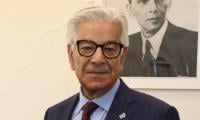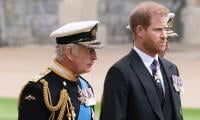ISLAMABAD: The Islamabad High Court (IHC) Tuesday rejected former prime minister and PML-N Rahber Muhammad Nawaz Sharif’s plea for exemption from court appearance in the Al-Azizia and Avenfield cases and issued his non-bailable arrest warrant.
The court directed that Nawaz Sharif be produced before it on September 22. A division bench, comprising Justice Aamir Farooq and Justice Mohsin Akhtar Kayani, heard Nawaz’s appeals against his conviction in the two references.
Justice Aamir Farooq asked why a petition had been filed for cancellation of Nawaz Sharif’s bail, as first the court had to decide whether his plea was acceptable or not. He remarked that the court would hear Nawaz Sharif’s exemption plea first.
To this, Nawaz counsel Khawaja Haris referred to a case against former president General (retd) Pervez Musharraf related to investigation into his assets and said his lawyer had been allowed to appear before the court. He said in the high-treason case, the Special Court had declared General Pervez Musharraf an absconder but the Supreme Court heard his lawyer.
He argued that in exceptional circumstances, the accused’s lawyer could be allowed to appear instead of the accused. Haris further argued that the trial could not stop on the basis of non-appearance of the accused.
“The court can appoint a public prosecutor for the accused and proceed with the trial. As of now, Nawaz Sharif cannot appear before the court,” he said.
He referred to the Supreme Court’s Hayat Bakhsh case of 1981 in which a procedure had been formulated for the declared absconder. The bench asked the counsel to describe the unusual circumstances that he thought applied to his case. Haris replied that the apex court heard the plea of the fugitive accused for various reasons.
"Nawaz Sharif's case is similar, as he spent time in jail after his conviction and filed an appeal," he said, adding that now the court had to decide whether Nawaz Sharif was an absconder. Justice Kayani remarked that in the case referred to by Haris, the accused had escaped from jail. Haris prayed that it was a more serious crime in which the appeal of the accused was decided on merit.
The bench asked Haris ifhe wanted the court to defer the hearing of appeals, or they should be heard in the absence of Nawaz Sharif. To this, Harris replied that he wanted to defer the hearings. “You are saying that even if Nawaz Sharif is declared a fugitive, the court should decide his appeals on merit?” the court asked.
Harris replied that he had also requested that no action be taken if his client was absconding. The bench observed that Haris had made it very clear that Nawaz Sharif's bail in Al-Azizia reference was ineffective and he did not surrender before the court.
Additional Prosecutor General NAB Jahanzeb Khan Bharwana argued that Nawaz Sharif’s petitions were inadmissible. “Let's assume that Nawaz Sharif's request came before he was declared an absconder. On this basis, even if it goes further, his application will be rejected, as the basic rule is that the accused must surrender. The fugitive accused can be sentenced to three-year imprisonment under the NAB ordinance,” the additional prosecutor general said.
“It is the responsibility of Nawaz’s representative to ensure his presence in the court,” he argued. He added that Nawaz Sharif was deliberately disobeying court orders, and that the court had the power to reject the fugitive's appeal or to appoint a lawyer for him.
“The court gave Nawaz Sharif two chances to surrender but he did not,” he said. “Giving relief to fugitives will affect the justice system,” the prosecutor argued. Khawaja Haris told the court that Nawaz Sharif was in London and doctors were not allowing him to travel because of his medical condition.
In his petition, Nawaz said he would get back by the next flight the moment his doctors allowed him to travel. Medical certificates are also attached with his plea. Haris argued that the federal government and NAB didn’t challenge the medical certificates of Nawaz Sharif.
To this, Justice Aamir Farooq remarked that the medical certificates were the opinion of consultants not from any hospital. “There is no statement from any hospital that they are not admitting Nawaz Sharif because - of COVID 19. If he has to live outside the hospital, then why not in Pakistan?”
Justice Mohsin Akhtar Kayani remarked that Nawaz neither underwent a surgery despite citing it as a reason behind obtaining bail to travel to the United Kingdom nor was he admitted to a hospital. "Our bail order has expired, which has its own effects," the judge said.
The non-bailable arrest warrants were issued in order to ensure the PML-N leader's appearance at an upcoming hearing on September 22. Hearing the arguments, the court rejected Nawaz Sharif’s exemption plea in the two references. The bench issued his non-bailable arrest warrants and ordered his production in the court on September 22.
Khawar Manika's counsel continued his arguments on Wednesday in a petition filed by Imran Khan and Bushra Bibi
IHC reserved judgment on the petition against registration of cases against former interior minister Sheikh Rashid on...
Saudi woman who was reportedly kidnapped from Islamabad’s residential Sector F-8 in mysterious circumstances, has...
Pakistan Navy warship rescued 8 Iranian fishermen after their boat caught fire in the open sea
SC dismissed appeal against SHC order that turned down application of partner seeking extension of time to furnish...
Executive board of International Monetary Fund will meet on April 29 to discuss the approval of $1.1 billion funding...







